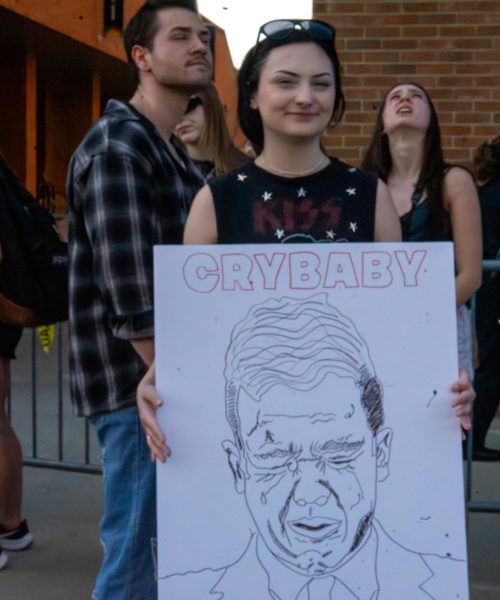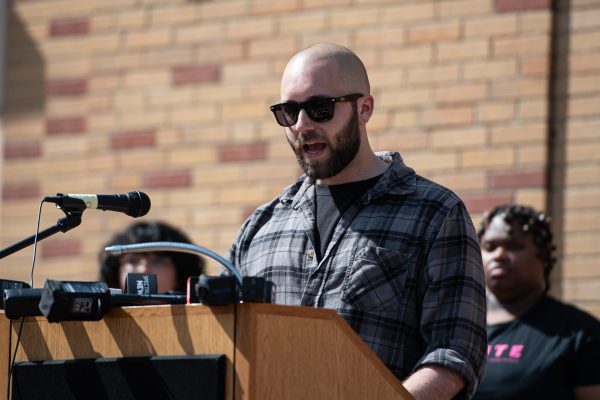Permanent seats removed
April 5, 2007
BUS, ACPB, IGPB no longer have sure spots on allocations committee after USS vote
Sean Groves, senator for business and finance, spoke to the senate about the proposed guideline changes for the allocations committee before it was voted on.
Brian Marks | Daily Kent Stater
Credit: Ron Soltys
After a heated debate at its meeting yesterday, the Undergraduate Student Senate voted 5-2 in favor of removing the permanent seats held by three student organizations in the Allocations Committee.
According to the new guidelines, the permanent seats held by the All Campus Programming Board, Black United Students and the Inter-Greek Programming Board will become at-large seats.
Before taking effect, the guideline changes for the Allocations Committee must also be approved by Pete Goldsmith, vice president of enrollment management and student affairs at Kent State.
Sean Groves, senator for business and finance, said he was pleased with the USS vote.
“This has been something that has been talked about a long time,” he said. “The vote turned out how I expected it to, so now it rests on Vice President Goldsmith.”
Groves said he discussed the removal of the permanent seats with Goldsmith several weeks ago.
“I’m just hoping he doesn’t allow the opposition of one student organization to dictate a policy that affects all student organizations,” he said.
Yet, Carla Smith, Allocations Committee member representing BUS, said she does not expect the administration to pass the changes.
“I think they will at least have something to say about it,” she said. “I think they will consider factors Senate has not thought of.”
Meanwhile, Carla Smith and Shanelle Smith, president of KSU-NAACP, said as a result of the vote, they will not advocate that members of their organizations support Senate programs.
Shana Scott, president of ACPB, said the permanent seat removal will continue to strain relations between USS and ACPB.
In addition, Scott said the elimination of ACPB’s permanent seat will have negative consequences in the Allocations Committee because of the organization’s broad programming knowledge.
“I don’t feel as though they are going to have cultured and diverse members of the Allocations Committee to have knowledge for events,” she said.
Prior to the vote, Preston Mitchum, senator for academic affairs who voted against the changes, said the changes seem to target certain organizations at Kent State.
“I’m having a hard time understanding why certain organizations always get pin-pointed,” he said. “Whether you see it or not, I do.”
Groves said the principles of fairness and equality are at stake with the permanent seat removal, regardless of how many student organizations actually seek funding from the Allocations Committee.
“While we do have a lot of student organizations here, a lot of them don’t do programming, but what we have to focus on are those student organizations that do programming, and that’s what this comes down to,” he said.
Even so, Mitchum said he thinks removing the permanent seats does not guarantee fairness in the Allocations Committee because voting bias cannot be prevented.
For example, Mitchum said he estimated about 80 percent of the people who apply for a seat on the Allocations Committee are part of Kent State’s Greek community.
Groves said this year’s Allocations Committee includes three Greek members and four BUS members.
Amy Groya, senator for governmental affairs who also sits on the Allocations Committee, said outside affiliations should not matter.
“If it’s a good program, I’m going to vote for it,” she said. “It has nothing to do with the fact that I’m a member of Delta Zeta.”
However, Mitchum said Groya’s statement acted as a contradiction to the permanent seat removal because BUS members are also expected to vote fairly.
Carla Smith said the question is whether a BUS member can be guaranteed an at-large seat on the committee if a qualified student applies.
“You can’t say that you can guarantee that,” she said. “With the BUS seat, you guarantee a seat that represents diversity.”
In addition, Carla Smith said there have not been unfair voting practices with this year’s Allocations Committee.
But Groves said that can change by year, and he thinks removing the permanent seats creates a fair playing field for all student organizations.
“Right now, there is no clear-cut definition to decide which student organizations get a permanent seat and which do not,” he said.
Groves said he does not expect Goldsmith to make a decision about the Allocations Committee’s guideline changes until the summer.
Contact student politics reporter Jackie Valley at [email protected].























